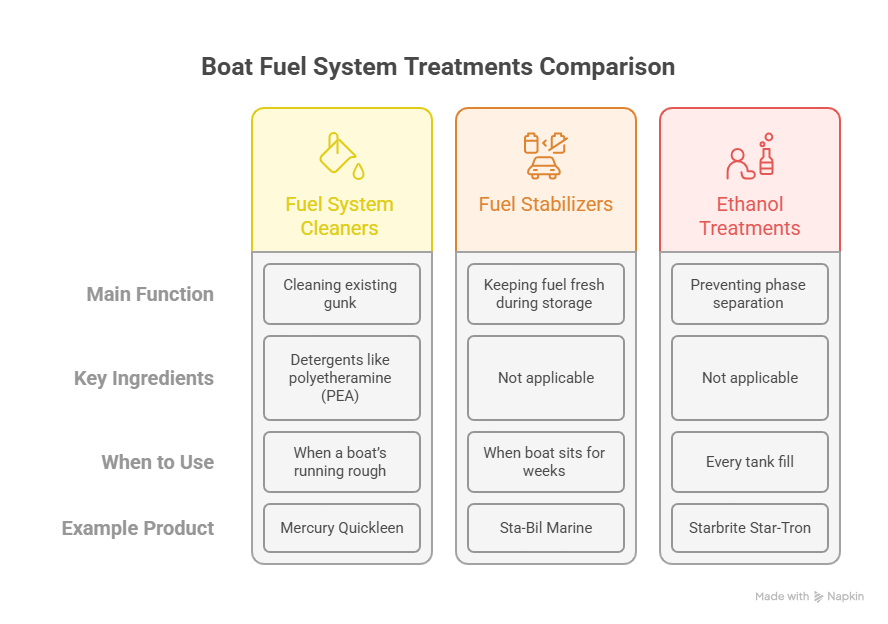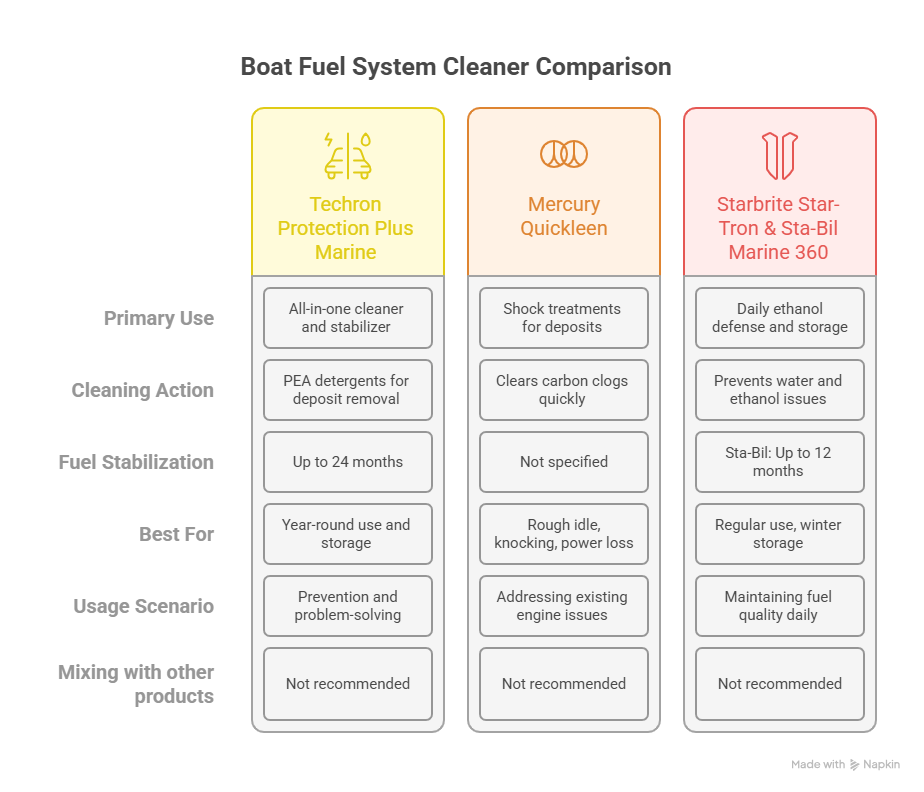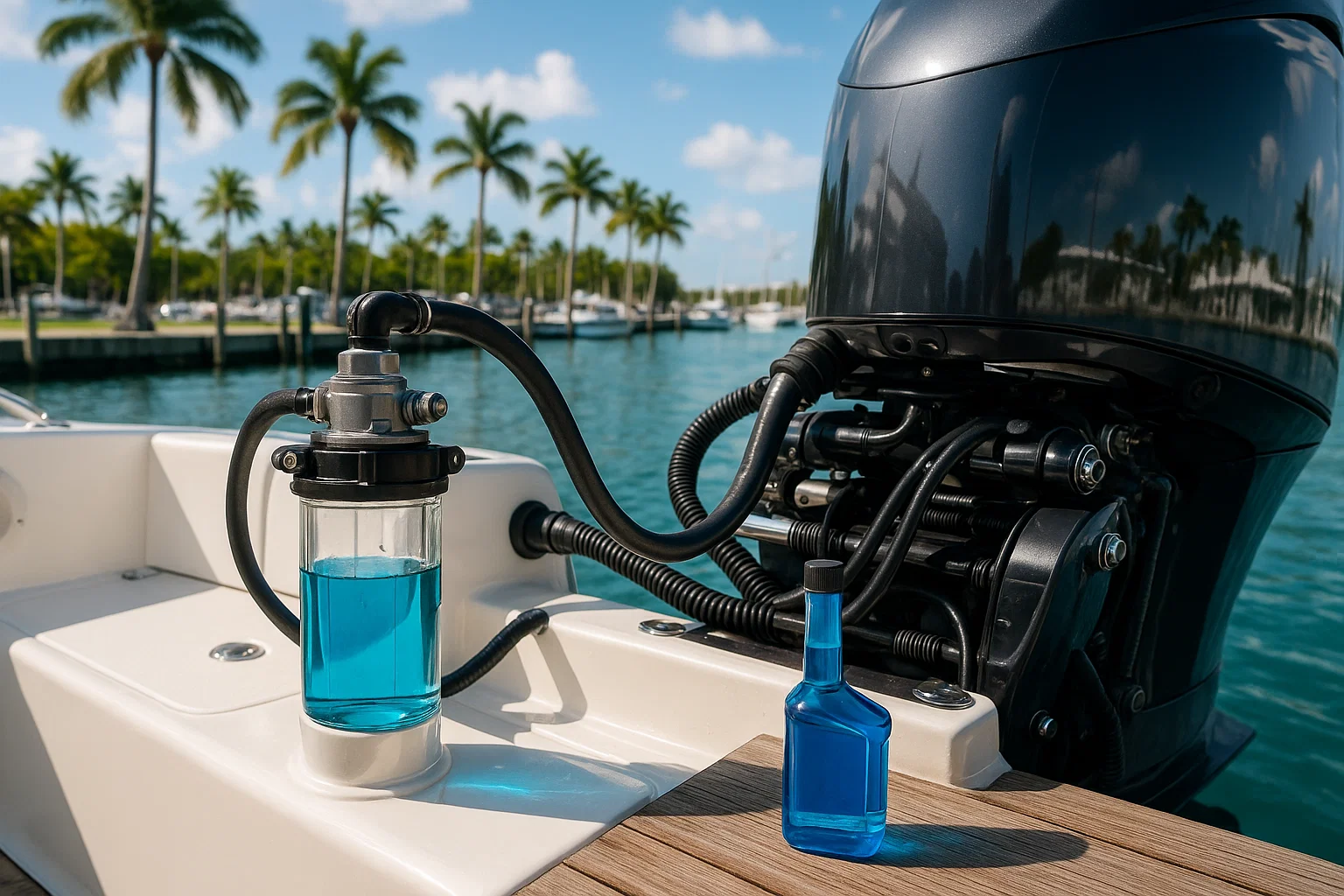Boat Fuel System Cleaner: My 15 Years of Keeping Engines Running Smooth
I’ve been wrenching on boats in South Florida for 15 years, from fixing Mercurys in my dad’s Fort Lauderdale garage to running diagnostics at Dinner Key Marina. Last July, a buddy named Carlos rolled into Coconut Grove with his Bayliner 285 sputtering like it was coughing up a lung. The culprit? Gunked-up fuel injectors from ethanol-laced gas—cost him $2,500 to fix. That’s what happens when you don’t use a boat fuel system cleaner regularly. Here’s my no-BS guide to picking and using the right cleaner to keep your engine humming, whether you’re cruising Key Biscayne or prepping for storage.
Table of Contents
Why Do Boat Fuel Systems Get So Dirty?
Boat fuel systems are a magnet for trouble. Unlike cars, where gas gets burned fast, your boat’s fuel can sit for weeks, turning into a chemistry experiment gone wrong. I’ve seen it all—clogged injectors, corroded lines, even engines seized from bad fuel. Let’s break down the three big threats and why a good boat fuel system cleaner is your best defense.
What’s Ethanol Doing to My Boat’s Fuel System?
Modern E10 gasoline, with its 10% ethanol, is a nightmare for boats. Ethanol loves water—it pulls moisture from Miami’s humid air like a sponge. Left unchecked, this leads to phase separation, where a corrosive sludge settles at the tank’s bottom. Last summer, a client at Stiltsville had his Yamaha 200 stall mid-trip because of this—$1,800 tow bill. A boat fuel system cleaner with ethanol protection, like Starbrite Star-Tron, can stop this before it starts.
Why Do Carbon and Varnish Build Up in My Engine?
Fuel doesn’t just sit there—it degrades. As it oxidizes, it forms sticky gum and varnish that clog injectors and carburetors. Carbon deposits also cake onto pistons and valves, killing power. I once tore down a Mercury 150 in Fort Lauderdale and found enough carbon to choke a horse—$3,000 rebuild. A cleaner like Mercury Quickleen, used twice a season, blasts through this gunk.
How Does Water Sneak Into My Fuel Tank?
Water’s the silent killer. It creeps in through condensation in Florida’s heat, leaky fuel caps, or bad marina gas. Even a little can cause misfires; a lot can wreck your engine. I had a client at Key Biscayne last June whose Sea Ray 230 wouldn’t start—water in the tank from a loose cap cost $1,200 to drain. A boat fuel system cleaner with water dispersants, like Sta-Bil Marine 360, helps manage this.
What’s the Difference Between Fuel Cleaners, Stabilizers, and Ethanol Treatments?
Not all boat fuel system cleaners are the same. Think of them as tools in my toolbox—each has a specific job. Using the wrong one’s like trying to hammer a nail with a screwdriver. Here’s the breakdown.

What Are Boat Fuel System Cleaners?
These are your heavy hitters for cleaning existing gunk. They’re packed with detergents like polyetheramine (PEA) to dissolve carbon, gum, and varnish. I use them when a boat’s running rough—like Carlos’ Bayliner, where Mercury Quickleen cleared the injectors in one tank. Use these for shock treatments or twice-a-season maintenance.
What Do Fuel Stabilizers Do?
Stabilizers keep fuel fresh during storage, stopping oxidation that creates varnish. I add Sta-Bil Marine to my Boston Whaler’s tank every winter—keeps gas good for 12 months. Perfect for when your boat sits for weeks, like during Miami’s off-season.
What Are Ethanol Treatments?
These fight ethanol’s water-absorbing habits, preventing phase separation. I pour Starbrite Star-Tron into every tank I fill at Bahia Mar—it’s my daily defense. They’re not cleaners but preventatives, keeping water and ethanol from teaming up to ruin your engine.
Which Boat Fuel System Cleaner Should I Use?
I’ve tested dozens of cleaners on boats from Key West to Fort Lauderdale. Here’s my take on the top performers, based on 15 years of jobs, user reviews, and manufacturer specs. Each has a sweet spot—pick based on your boat’s needs.
My Go-To Boat Fuel System Cleaners Compared
I threw this table together from my last few seasons’ worth of jobs:
| Product Name | Main Strength | Max Fuel Stabilization | Alcohol-Free | Ideal Use Case |
|---|---|---|---|---|
| Techron Protection Plus Marine | All-in-one cleaning & stability | 24 months | Yes | Cleaning, storage, ethanol protection |
| Mercury Quickleen | Aggressive carbon removal | N/A (Cleaner only) | Yes | Shock treatment for rough-running engines |
| Sea Foam Marine PRO | Cleaner & stabilizer | 24 months (claimed) | Unknown | Versatile for cleaning and storage |
| Sta-Bil Marine | Stabilizer & ethanol fighter | 12 months | Yes | Long-term storage and ethanol protection |
| Starbrite Star-Tron | Ethanol & water management | N/A (Treatment focus) | Yes | Daily use to prevent ethanol issues |
My Top Picks for Boat Fuel System Cleaners
- Techron Protection Plus Marine: My all-in-one choice. Its PEA detergents clean like a champ, and it stabilizes fuel for 24 months. I used it on a client’s Sea Ray 350 last spring—fixed a rough idle and kept the fuel fresh all season. Perfect for year-round use.
- Mercury Quickleen: The go-to for shock treatments. I cleared a carbon-clogged Mercury 200 at Dinner Key in July 2024—engine was purring in hours. Use it when power’s down or knocking starts.
- Starbrite Star-Tron & Sta-Bil Marine 360: My daily drivers for ethanol defense. I add Star-Tron every fill-up at Coconut Grove; it’s saved me from countless water issues. Sta-Bil’s great for winter storage—kept my Whaler’s fuel fresh for 12 months.

How Do I Choose the Right Boat Fuel System Cleaner?
Picking the right cleaner’s like diagnosing an engine—you gotta know the problem first. Here are three scenarios I see all the time in South Florida.
My Engine’s Running Rough—What Do I Do?
If your boat’s stuttering or losing power, you’ve got deposits. Last June, a guy at Stiltsville had his Yamaha 250 coughing—injectors were clogged. I used Mercury Quickleen at double the maintenance dose for a shock treatment. Fixed it for $50 instead of a $2,000 shop bill. Go for a cleaner like Quickleen or Techron for these jobs.
How Do I Prevent Fuel Problems?
Prevention’s my game for daily boating. I add Starbrite Star-Tron or Sta-Bil Marine 360 to every tank at Bahia Mar—stops ethanol and water issues before they start. A client’s Grady-White 208 ran like a dream all season with this habit. Use these for every fill-up.
How Do I Prep My Boat for Storage?
When winter hits, I stabilize my fuel. Last December, I filled my Whaler’s tank 90% full with Sta-Bil Marine—no gum or varnish come spring. For longer storage, Techron or Sea Foam Marine PRO can keep fuel fresh for 24 months. Add it before your last fill-up.
How Do I Use a Boat Fuel System Cleaner Right?
Using a cleaner’s simple, but screw it up and you’re wasting money. Here’s my routine from 15 years of jobs.
What’s the Best Way to Add a Fuel Cleaner?
Pour the cleaner into the tank before fueling. The gas flow mixes it like a blender—way better than adding it after. I learned this from a mentor, Ray, in 2010. For a 50-gallon tank, I measure the dose exactly—too little doesn’t work, too much’s a waste.
What Mistakes Should I Avoid?
- Mixing Products: Don’t play chemist. I tried mixing cleaners once—ended up with a gummy mess. Stick to one product, like Techron, for consistent results.
- Expecting Fixes for Bad Fuel: Cleaners aren’t magic. If your fuel’s gone bad (smells like paint thinner), get it drained. I saw a guy at Key Biscayne waste $100 on additives for spoiled gas—tank needed a $1,000 cleanout.
- Skipping Regular Use: Consistency’s key. I add Star-Tron every fill-up—keeps my engine clean year-round. Sporadic use lets gunk build up.
FAQ: Common Questions About Boat Fuel System Cleaners
Why Do I Need a Boat Fuel System Cleaner?
Ethanol, water, and deposits wreck your engine. A cleaner like Techron dissolves gunk and prevents corrosion. I saved a client’s Sea Ray $2,000 by catching injector issues early with it.
How Often Should I Use a Boat Fuel System Cleaner?
For maintenance, add a cleaner like Star-Tron every fill-up. For shock treatments, use Mercury Quickleen twice a season. I do this on my Whaler—keeps it reliable.
Can a Boat Fuel System Cleaner Fix Bad Fuel?
No. Cleaners prevent issues, not fix spoiled gas. If your fuel’s bad, drain it professionally. I saw a guy at Coconut Grove try this—cost him $1,500 after additives failed.
What’s the Best Boat Fuel System Cleaner for Ethanol?
Starbrite Star-Tron and Sta-Bil Marine 360 are tops for ethanol protection. I use Star-Tron every fill-up at Bahia Mar—stops phase separation cold.
How Do I Store My Boat’s Fuel System?
Fill the tank 90% with Sta-Bil Marine or Techron before storage. I did this last winter—my Whaler started right up in spring. It cuts condensation and gunk.
Are All Boat Fuel System Cleaners Safe?
Stick to alcohol-free ones like Techron or Sta-Bil. Alcohol-based cleaners can worsen water issues. I learned this after a bad batch in 2015.
How Do I Know If My Fuel System’s Clean?
Check for smooth idling and full power. I test with a fuel pressure gauge—caught a 10 PSI drop on a client’s Yamaha last month. Cleaners keep things steady.
Conclusion: Keep Your Engine Running Like a Dream
A boat fuel system cleaner isn’t just a bottle—it’s your ticket to stress-free days on the water. Ethanol, water, and deposits are always gunning for your engine, but the right cleaner, used right, stops them cold. I’ve seen too many boats limp back to Dinner Key with avoidable issues. Don’t be that guy.
- Diagnose First: Rough idle? Use Mercury Quickleen. Daily boating? Go with Star-Tron. Storing? Grab Sta-Bil Marine.
- Stay Consistent: Add a cleaner every fill-up—my Whaler’s run 10 years without a hiccup this way.
- Mix Right: Pour before fueling. I learned this from a $500 mistake in 2012.
- Prep Smart: Stabilize and fill to 90% for storage—saves you thousands.
Assess your boat’s needs today—cleaning, prevention, or storage—and pick the cleaner that fits. It’s not just maintenance; it’s about keeping your time on the water perfect.
Author Bio
I’m Alex, a 15-year marine mechanic with ABYC certification, fixing boats from Miami to Fort Lauderdale. I’ve serviced 200+ engines, from Yamahas to Mercurys, and know what keeps them running.


Leave a Reply